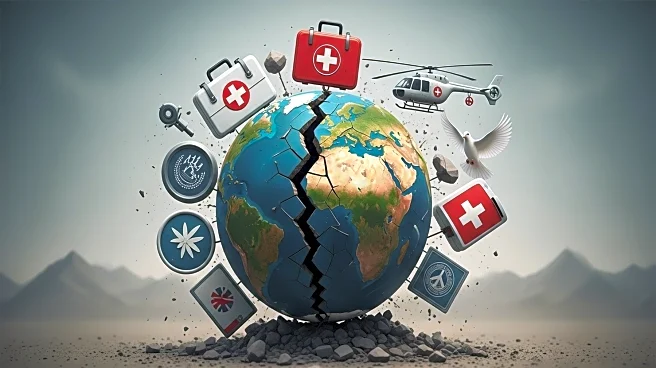What's Happening?
The Taliban has called for international assistance following a devastating 6.0-magnitude earthquake in eastern Afghanistan, which has resulted in over 1,400 deaths and more than 3,000 injuries. The earthquake has severely impacted remote regions, particularly in Konar province, where entire villages have been flattened. Rescue efforts are being hampered by landslides and blocked roads, making it difficult to reach affected areas. The Taliban's National Disaster Management Authority has emphasized the need for international humanitarian aid, as the country struggles with reduced foreign assistance following recent U.S. aid cuts.
Why It's Important?
The earthquake has exacerbated Afghanistan's existing humanitarian crisis, which has been worsened by significant cuts in international aid, particularly from the United States. These cuts have affected the country's ability to respond to natural disasters, with shortages in medical supplies and humanitarian resources. The reluctance of international donors to support the Taliban regime further complicates the situation, potentially leaving many victims without necessary aid. The disaster highlights the ongoing challenges faced by Afghanistan under Taliban rule, including international isolation and internal governance issues.
What's Next?
The international community's response to the Taliban's appeal for aid will be crucial in determining the effectiveness of the disaster response. Neighboring countries like Iran, Pakistan, and China have offered support, but broader international assistance remains uncertain. The U.N. and other humanitarian organizations are working to recommission resources, such as air support, to reach remote areas. The situation underscores the need for a coordinated international effort to address the immediate humanitarian needs while navigating the complex political landscape.
Beyond the Headlines
The earthquake has brought to light the broader implications of the Taliban's governance, particularly its impact on women's rights and the country's ability to manage crises. The regime's strict gender policies have hindered disaster response efforts, as female experts and workers face restrictions. The international community's hesitance to engage with the Taliban due to its oppressive policies further isolates Afghanistan, complicating efforts to provide necessary aid and support.









